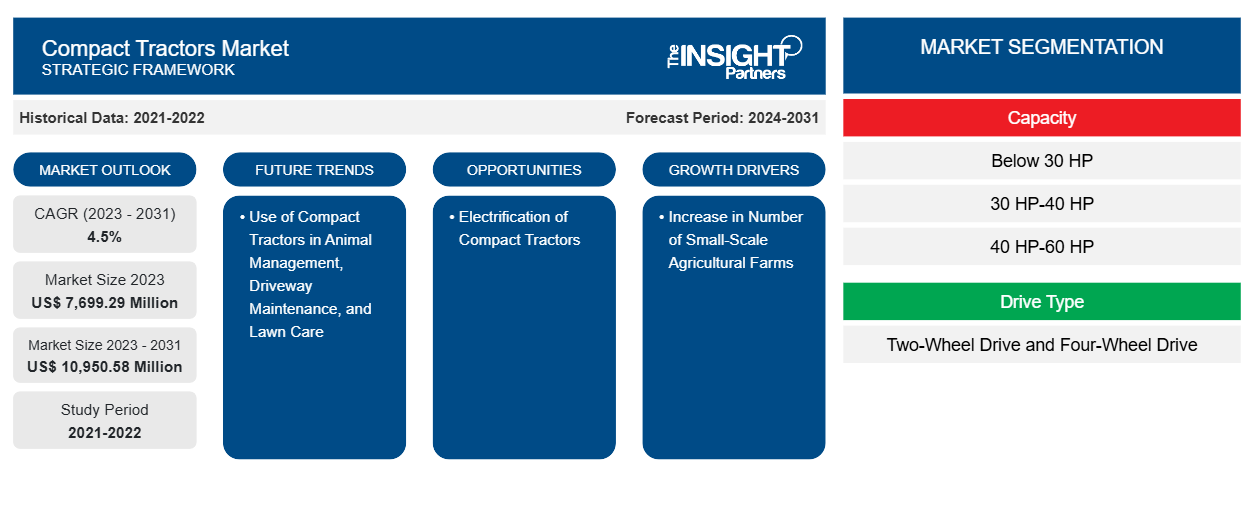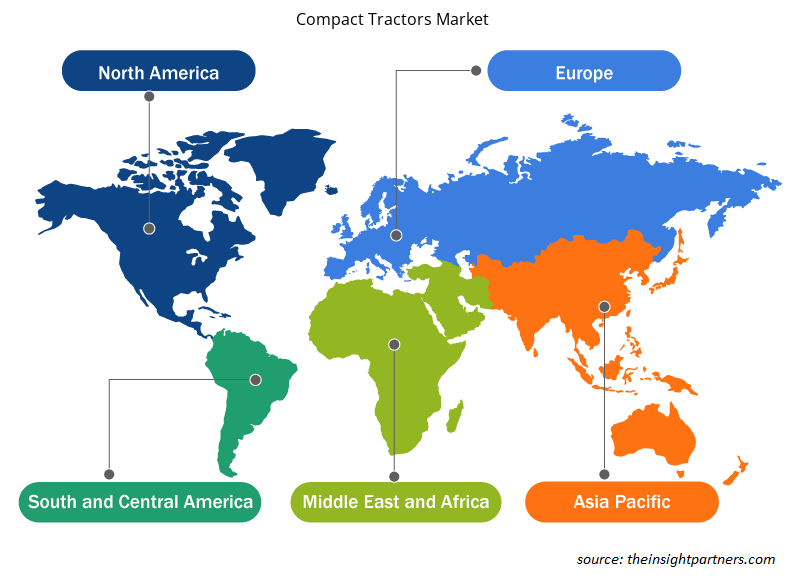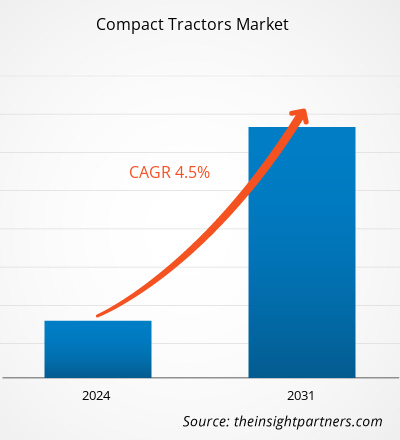The compact tractors market size is projected to reach US$ 10,950.58 million by 2031 from US$ 7,699.29 million in 2023. The market is expected to register a CAGR of 4.5% during 2023–2031. The growing application of compact tractors in different end uses, such as driveway maintenance, lawn care, and animal or livestock management, is likely to remain a key trend in the market.
Compact Tractors Market Analysis
The growing application of compact tractors in different end uses such as driveway maintenance, lawn care, and animal or livestock management demonstrates major growth opportunities for the compact tractors market. Reducing human intervention and increasing machine applications for routine duties are boosting the use of compact tractors.
Compact Tractors Market Overview
Compact tractors have major applications in small-scale agricultural land, vineyards, fruit, and nut yards. In addition, compact tractors are useful for gardening and landscaping. Moreover, they have potential end use in the construction sector for carrying goods. Furthermore, compact tractors are useful for snow removal and road maintenance. In mining operations, compact tractors excavate and haul rubble or gravel.
Customize This Report To Suit Your Requirement
You will get customization on any report - free of charge - including parts of this report, or country-level analysis, Excel Data pack, as well as avail great offers and discounts for start-ups & universities
Compact Tractors Market: Strategic Insights

- Get Top Key Market Trends of this report.This FREE sample will include data analysis, ranging from market trends to estimates and forecasts.
You will get customization on any report - free of charge - including parts of this report, or country-level analysis, Excel Data pack, as well as avail great offers and discounts for start-ups & universities
Compact Tractors Market: Strategic Insights

- Get Top Key Market Trends of this report.This FREE sample will include data analysis, ranging from market trends to estimates and forecasts.
Compact Tractors Market Drivers and Opportunities
Increase in Number of Small-Scale Agricultural Farms to Favor Market
The growing focus on small-scale farming is one of the prime drivers for the compact tractors market globally. The increasing number of small-scale agricultural farms in developing and developed nations is boosting the application of compact tractors globally. The increase in government policies and supportive initiatives such as funding is also boosting the number of small-scale farms in different countries. The growing government focus on small-scale agricultural farms is boosting the small and mid-sized farming sector, fueling the use of compact tractors globally.
Electrification of Compact Tractors
Major agricultural countries such as India are emphasizing electrifying compact tractors to lower operational time and upsurge productivity by mechanizing the procedures. The advancement of hybrid compact tractors is one of the market's major future trends. The strengthening concern of environmental pollution, climate change, and soil pollution is also improving the enhancement of electrified compact tractors, which are low on carbon emissions and more environment friendly.
Compact Tractors Market Report Segmentation Analysis
Key segments that contributed to the derivation of the compact tractors market analysis are capacity, drive type and end-use.
- Based on the capacity, the compact tractors market is divided into below 30 HP, 30 HP-40 HP, and 40 HP-60 HP. The 40 HP - 60 HP segment held a larger market share in 2023.
- Based on the drive type, the compact tractor market is divided into two-wheel drive and four-wheel drive. The two-wheel drive segment held a larger market share in 2023.
- Based on the end-use, the compact tractors market is divided into agriculture and utility. The agriculture segment held a larger market share in 2023.
Compact Tractors Market Share Analysis by Geography
The geographic scope of the compact tractors market report is mainly divided into five regions: North America, Asia Pacific, Europe, Middle East & Africa, and South & Central America.
Asia Pacific is leading the market. The growing agricultural sector and demand for growing development of small-scale agricultural farms due to rising government focus on the agricultural sector are driving the growth of compact tractors in the Asia Pacific. The high presence of compact tractor manufacturers and the integration of electrification in compact tractors are projected to drive the growth of the compact tractor market in North America.
Compact Tractors Market Regional Insights
The regional trends and factors influencing the Compact Tractors Market throughout the forecast period have been thoroughly explained by the analysts at The Insight Partners. This section also discusses Compact Tractors Market segments and geography across North America, Europe, Asia Pacific, Middle East and Africa, and South and Central America.

- Get the Regional Specific Data for Compact Tractors Market
Compact Tractors Market Report Scope
| Report Attribute | Details |
|---|---|
| Market size in 2023 | US$ 7,699.29 Million |
| Market Size by 2031 | US$ 10,950.58 Million |
| Global CAGR (2023 - 2031) | 4.5% |
| Historical Data | 2021-2022 |
| Forecast period | 2024-2031 |
| Segments Covered |
By Capacity
|
| Regions and Countries Covered | North America
|
| Market leaders and key company profiles |
Compact Tractors Market Players Density: Understanding Its Impact on Business Dynamics
The Compact Tractors Market is growing rapidly, driven by increasing end-user demand due to factors such as evolving consumer preferences, technological advancements, and greater awareness of the product's benefits. As demand rises, businesses are expanding their offerings, innovating to meet consumer needs, and capitalizing on emerging trends, which further fuels market growth.
Market players density refers to the distribution of firms or companies operating within a particular market or industry. It indicates how many competitors (market players) are present in a given market space relative to its size or total market value.
Major Companies operating in the Compact Tractors Market are:
- Agro Tractors SpA
- Same Deutz-Fahr Italia SpA
- Iseki and Co Ltd
- LS Mitron Ltd
- Yanmar Holding Co Ltd
- AGCO Corp
Disclaimer: The companies listed above are not ranked in any particular order.

- Get the Compact Tractors Market top key players overview
Compact Tractors Market News and Recent Developments
The compact tractors market is evaluated by gathering qualitative and quantitative data post primary and secondary research, which includes important corporate publications, association data, and databases. A few of the developments in the compact tractors market are listed below:
- LS Mitron Ltd launched a premium compact tractor MT2 for returning farmers during the exhibition. The MT2 has a compact yet ergonomic design and precise technology to let prospective farmers work productively and conveniently. This product is designed for working in tight locations such as orchards, with features such as a dual pedal that allows the operator to move the vehicle forward and backward effortlessly. (Source: LS Mitron Ltd, Press Release, August 2023)
- Agro Tractors SpA launched the Fendt 200 Vario Series, which has a compact design and high performance. It is used in vineyards and orchards. FT 200 Vario leverages the FendtONE system and a spacious cab for optimal operations and the Fendt Gold Star Customer Care warranty for superior service and maintenance. The Fendt 200 Vario will be available for order through Fendt dealerships for delivery in 2024. (Source: Agro Tractors SpA, Press Release, February 2023)
Compact Tractors Market Report Coverage and Deliverables
The “Compact Tractors Market Size and Forecast (2021–2031)” report provides a detailed analysis of the market covering below areas:
- Compact tractors market size and forecast at global, regional, and country levels for all the key market segments covered under the scope
- Compact tractors market trends as well as market dynamics such as drivers, restraints, and key opportunities
- Detailed PEST and SWOT analysis
- Compact tractors market analysis covering key market trends, global and regional framework, major players, regulations, and recent market developments
- Industry landscape and competition analysis covering market concentration, heat map analysis, prominent players, and recent developments for the compact tractors market
- Detailed company profiles
Frequently Asked Questions
Which region dominated the compact tractors market in 2023?
Asia Pacific dominated the compact tractors market in 2023.
What are the future trends of the compact tractors market?
The use of compact tractors in animal management, driveway maintenance, and lawn care are the future trends of the compact tractors market.
Which are the leading players operating in the compact tractors market?
Same Deutz-Fahr Italia SpA, Agro Tractors SpA, Iseki and Co Ltd, Yanmar Holding Co Ltd, LS Mitron Ltd, AGCO Corp, CNH Industrial NV, Deere & Co, Kubota Corp, Mahindra and Mahindra are some of the leading players in the market.
What would be the estimated value of the compact tractors market by 2031?
US$ 10,950.58 million estimated value of the compact tractors market by 2031.
What is the expected CAGR of the compact tractors market?
4.5% is the expected CAGR of the compact tractors market.
- Historical Analysis (2 Years), Base Year, Forecast (7 Years) with CAGR
- PEST and SWOT Analysis
- Market Size Value / Volume - Global, Regional, Country
- Industry and Competitive Landscape
- Excel Dataset
- Boat Sails Market
- Heavy Commercial Vehicle Air Brake Systems Market
- Heavy Commercial Vehicle Clutch Market
- Electric Vehicle Heat Pump Systems Market
- Event Logistics Market
- Industrial Vehicles Market
- Motorsport Transmission Market
- Automotive Telematics Market
- Third Party Logistics Market
- Low Speed Electric Vehicle Market
Testimonials
Reason to Buy
- Informed Decision-Making
- Understanding Market Dynamics
- Competitive Analysis
- Identifying Emerging Markets
- Customer Insights
- Market Forecasts
- Risk Mitigation
- Boosting Operational Efficiency
- Strategic Planning
- Investment Justification
- Tracking Industry Innovations
- Aligning with Regulatory Trends
Yes! We provide a free sample of the report, which includes Report Scope (Table of Contents), report structure, and selected insights to help you assess the value of the full report. Please click on the "Download Sample" button or contact us to receive your copy.
Absolutely — analyst assistance is part of the package. You can connect with our analyst post-purchase to clarify report insights, methodology or discuss how the findings apply to your business needs.
Once your order is successfully placed, you will receive a confirmation email along with your invoice.
• For published reports: You’ll receive access to the report within 4–6 working hours via a secured email sent to your email.
• For upcoming reports: Your order will be recorded as a pre-booking. Our team will share the estimated release date and keep you informed of any updates. As soon as the report is published, it will be delivered to your registered email.
We offer customization options to align the report with your specific objectives. Whether you need deeper insights into a particular region, industry segment, competitor analysis, or data cut, our research team can tailor the report accordingly. Please share your requirements with us, and we’ll be happy to provide a customized proposal or scope.
The report is available in either PDF format or as an Excel dataset, depending on the license you choose.
The PDF version provides the full analysis and visuals in a ready-to-read format. The Excel dataset includes all underlying data tables for easy manipulation and further analysis.
Please review the license options at checkout or contact us to confirm which formats are included with your purchase.
Our payment process is fully secure and PCI-DSS compliant.
We use trusted and encrypted payment gateways to ensure that all transactions are protected with industry-standard SSL encryption. Your payment details are never stored on our servers and are handled securely by certified third-party processors.
You can make your purchase with confidence, knowing your personal and financial information is safe with us.
Yes, we do offer special pricing for bulk purchases.
If you're interested in purchasing multiple reports, we’re happy to provide a customized bundle offer or volume-based discount tailored to your needs. Please contact our sales team with the list of reports you’re considering, and we’ll share a personalized quote.
Yes, absolutely.
Our team is available to help you make an informed decision. Whether you have questions about the report’s scope, methodology, customization options, or which license suits you best, we’re here to assist. Please reach out to us at sales@theinsightpartners.com, and one of our representatives will get in touch promptly.
Yes, a billing invoice will be automatically generated and sent to your registered email upon successful completion of your purchase.
If you need the invoice in a specific format or require additional details (such as company name, GST, or VAT information), feel free to contact us, and we’ll be happy to assist.
Yes, certainly.
If you encounter any difficulties accessing or receiving your report, our support team is ready to assist you. Simply reach out to us via email or live chat with your order information, and we’ll ensure the issue is resolved quickly so you can access your report without interruption.





















 Get Free Sample For
Get Free Sample For